Rich results: 22 facts every SEO pro needs to know
Rich results, schema markup and structured data – where do you start? Get answers to your rich result questions from this article.
Rick and Morty.
Hall and Oates.
Coffee and bourbon.
Rich results and structured data.
All four: iconic duos. But only one can generate over $80k in revenue once added to your website.
On May 17, 2016, Google introduced the concept of “rich cards.” Google has revived rich cards into what SEO professionals call rich results today. Rich results were created to make a more engaging experience on Google’s search result pages.

The result of rich results is a crowd-pleasing SEO tactic that produces an average of 58 clicks per 100 queries. Rich results are a dry and smooth SEO move, with flavors of structured data sprinkled with schema markup alongside sweeter code of JSON-LD.
In the words of the 2022 Women in Tech SEO mentor, Anne Berlin:
- “For my money, I’d recommend implementing your rich result strategy from the get-go with as much detail as possible to extend the window of time before a change in policy forces you to make an overhaul to return your site to eligibility for a rich result which was previously driving traffic.”
Rich results make a great eye-opener and a quick win to start a new SEO project. And our need for SEO quick wins has never been greater.
Ahead are 22 things every SEO professional needs to know about rich results.
1. Rich snippets (previously rich cards) are now officially called rich results
Let’s be honest: Google changes names almost as often as Kanye West. As of today, Kanye West’s official name is now Ye. It’s got a Cher and Madonna vibe to it.
I digress.
When Google first released what SEO professionals call rich results today, rich results were called rich snippets, then rich cards.
Rich snippets and rich cards are rich results.
If you call rich results, rich snippets, or rich cards, you might as well start talking about your troll collection from the ’90s. (Remember yesterday? We were so young then.)
2. Rich results, schema, and structured data are not the same
There is a difference between rich results, schema markup, and structured data.
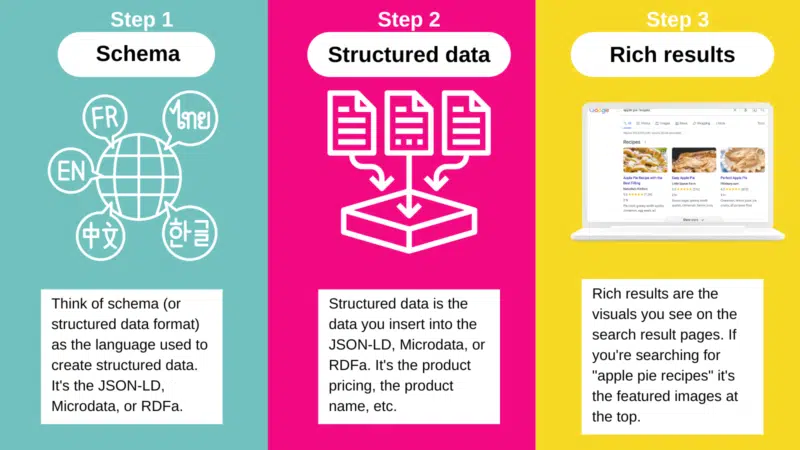
Schema markup (also called structured data format)
Google doesn’t describe exactly what schema markup is because “schema” is a part of a language from schema.org.
While schema.org is helpful, Google clarifies that SEO professionals should rely on Google Search Central documentation because schema.org isn’t focused only on Google search behavior.
Google refers to schema markup as “structured data format.”
Think of schema markup (or structured data format) as the language needed to create structured data.
Schema markup (or structured data format) is required before you can move on to structured data.
Structured data
Again, in Google’s words:
“Structured data is a standardized format for providing information about a page and classifying the page content; for example, on a recipe page, what are the ingredients, the cooking time and temperature, the calories, and so on.”
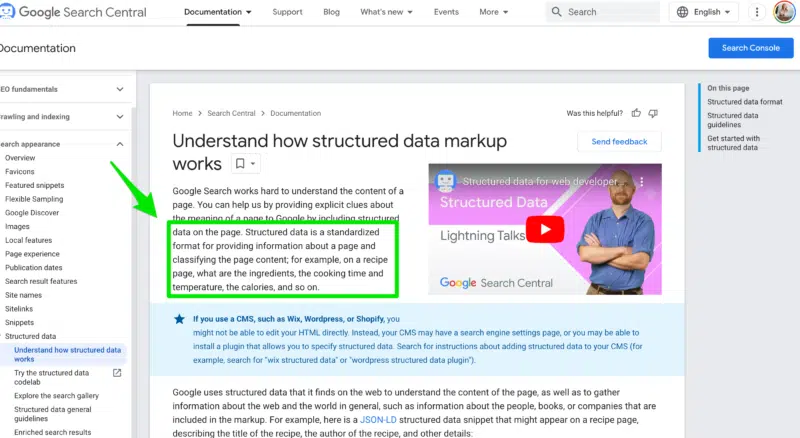
Ryan Levering, a software engineer at Google, breaks structured data down even further.
Rich results
In Google’s words:
“Rich results are experiences on Google Search that go beyond the standard blue link. They’re powered by structured data and can include carousels, images, or other non-textual elements. Over the last couple years we’ve developed the Rich Results Test to help you test your structured data and preview your rich results.”
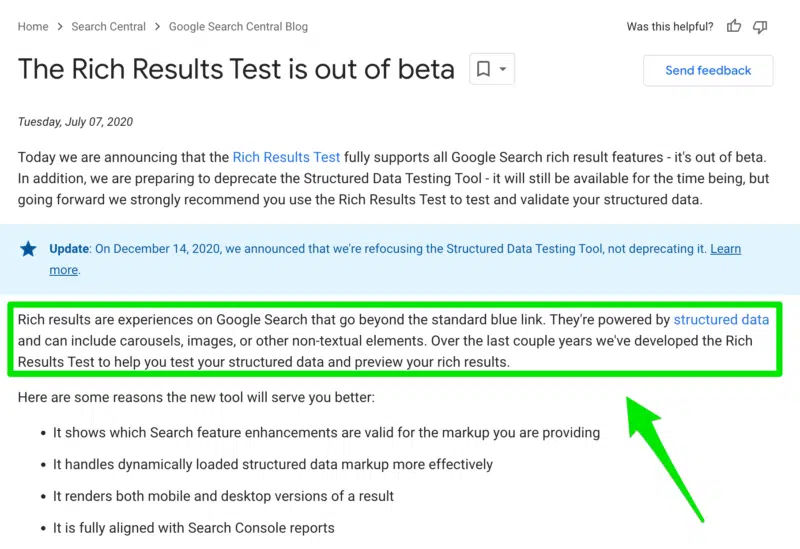
3. Always use Google documentation instead of schema.org
Schema.org is often used by SEO professionals when writing schema markups.
But the reality is Google wants you to use Google’s documentation. Not surprising, right?
Google’s own John Mueller himself answers this question in an episode of Ask A Google Webmaster.
And Google directly states it in its Introduction to Structured Data documentation.
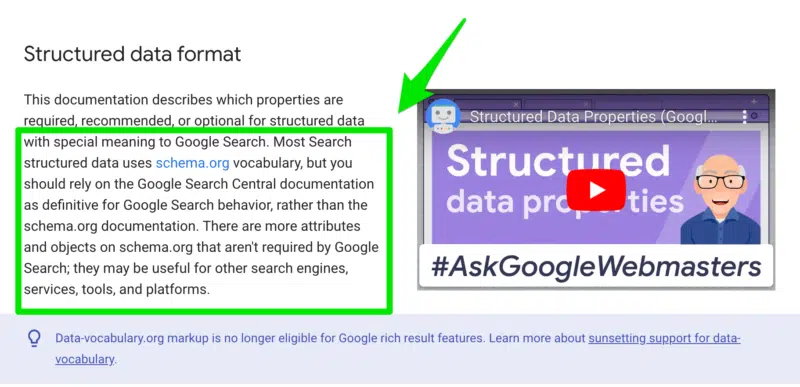
4. There are 32 different rich result types
In Google’s search gallery for structured data today, there are 32 different rich result types.
The rich result types include:
- Article
- Book
- Breadcrumb
- Carousel (only available for recipes, courses, restaurants, and movies)
- Course
- Dataset
- Education Q&A
- Employer aggregate rating
- Estimated salary
- Event
- Fact check
- FAQ
- Home activities
- How-to
- Image metadata
- Job posting
- Learning video
- Local business
- Logo
- Math solvers
- Movie
- Podcast
- Practice problems
- Product
- Q&A
- Recipe
- Review snippet
- Sitelinks search box
- Software app
- Speakable
- Subscription and paywalled content
- Video
5. Google Search Console doesn’t support all rich result types in its report
Have you ever looked at the Enhancements section in Google Search Console?

The Enhancement report gives SEO professionals the opportunity to monitor and track the performance of rich results.
Daniel Waisvery, Search Advocate at Google, shares how to monitor and optimize your performance in Google Search Console with rich results.
Unfortunately, Google Search Console only provides monitoring for 22 out of the 32 rich result types.
Google Search Console supports these 22 rich result types:
- Breadcrumb
- Dataset
- Education Q&A
- Event
- FAQ
- Fact check
- Guided recipe
- How-to
- Image metadata
- Job posting
- Learning video
- Logo
- Math solvers
- Merchant listings
- Practice problems
- Product snippet
- Q&A page
- Recipe
- Review snippet
- Sitelinks searchbox
- Special announcement
- Video
6. The Knowledge Graph is a type of rich result
Spoiler alert: the Knowledge Graph is a type of rich result.
You know, these things you see in the SERPs.

Bonus tip: Kristina Azarenko (featured in the knowledge graph above) has an epic course with copious amounts of technical SEO knowledge. I’ve taken it, and I’m a better SEO professional for it. And, no she didn’t pay me to say this.
7. Featured snippets are a type of rich result
Just when you thought you could read another SEO article and not see “featured snippets” again, here I am showcasing featured snippets.
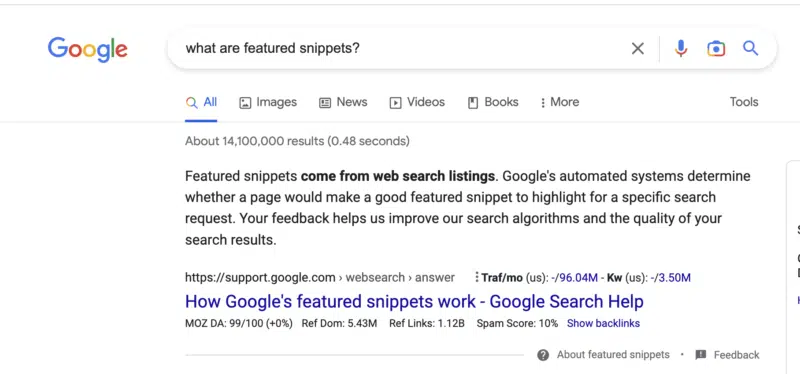
It looks like Google will continue to support this tactic as we’re seeing more FAQ rich results displayed in Google search.
8. You can have more than one type of rich result on one page
Video rich results. Breadcrumb rich results. FAQ rich results. All great things on their own. But better together when using markup on one page.
Can you guess how many rich results this product page from Keen Footwear has?

If you answered three rich results, please pat yourself on the back (and enjoy a virtual hug from me).
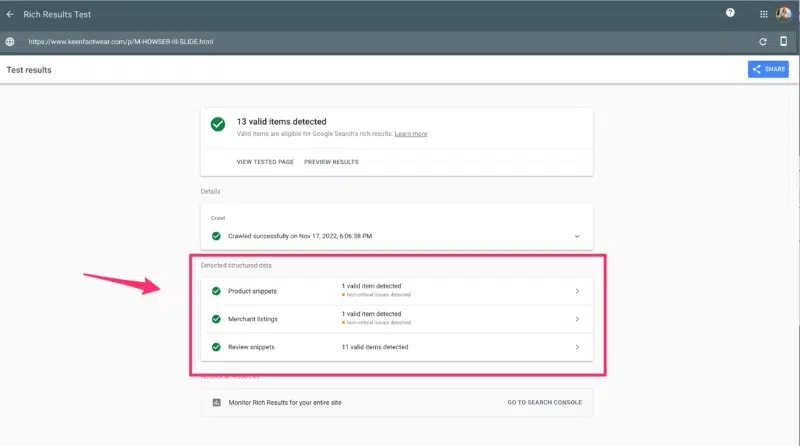
9. Rich result enhancements are ‘a thing’
Gosia Poddębniak from Onely wrote a great piece on rich results. He explains enhancements from rich results perfectly.
Essentially, the rich result enhancements you can achieve are based on the original rich result you’re going after.
For example, job posting structure data has multiple properties like date, description, organization, job location title, application location requirements, base salary, apply, employment type, etc.
The more properties you complete, the more enhancements you could get in Google SERPs.
10. Rich results must be written in JSON-LD, microdata or RDFa
If you want to be eligible for Google’s rich results, your markup has to be in JSON-LD, microdata or RDFa.
Gentlepeople, I give you: the Googleys. It’s like trying to be eligible for an Emmy, except you’re only eligible for a Google rich result.
JSON-LD, microdata, and RDFa are linked data formats. Ironically, JSON-LD is a form of RDF syntax.
Basically, these linked data formats help Google connect entities to other entities to help search engines better understand the context.
11. JSON-LD is the preferred rich result format
It’s official from the Sirs at Google, JSON-LD is the recommended structured data.
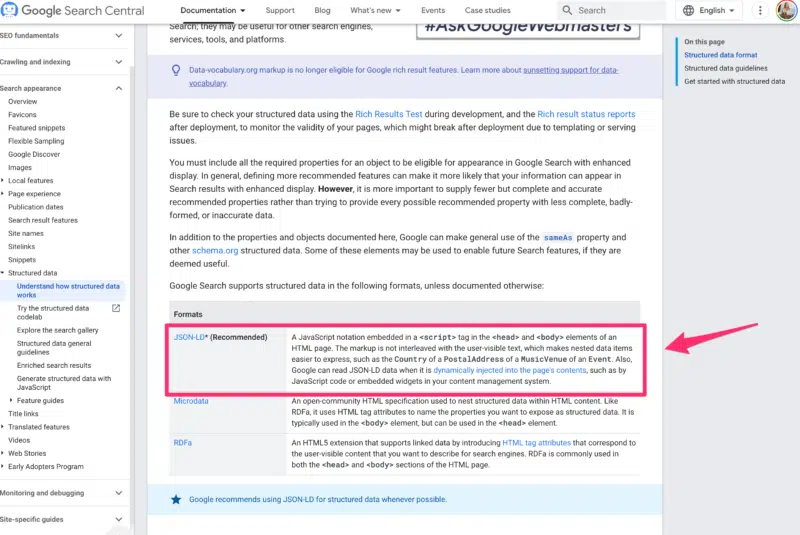
Why is JSON-LD the preferred rich result format?
It’s easy to implement and doesn’t impact page speed performance because it loads asynchronously.
12. It does not matter where on the page JSON-LD is implemented
Unlike many SEO-related code changes, structured data format does not need to go in the <head> section of your website.
Structured data format can be placed anywhere on your website.
13. Use a tool to automate your markup
I’m reminiscing about the words of the legendary Oprah, “You get a car. You get a car.”
So in honor of Oprah, this is your moment of freedom. Yes, you get a rich result tool. You don’t have to be a web developer to add markup to your website.
If you’re using WordPress, plugins like Yoast SEO or RankMath do it for you.
If you’re using Shopify, there are tools in the app store.
If you’re on Drupal or Sitecore (or any other enterprise website custom-coded language), I’d recommend SchemaApp.
Or, if you’re into Google Tag Manager, you can add structured data with GTM.
Just be careful. When I spoke with Anne Berlin, Senior Technical SEO at Lumar, she shared that this can backfire on very slow sites.
- “Where there is an excessive amount of (particularly render-blocking third party) Javascript on a site, the schema may not be injected into the DOM before googlebot’s render timeout window is hit, and it moves on from the page. So this is a commonly used method, and has multiple advantages, but important to be aware that there may periodically be detection or validation issues when this method is used on an already slow template.”
14. Always test using the rich result test tool
The rich result tool is your friend.
At the risk of stating the obvious, this rich result test tool is – very useful.
Mostly because now you don’t have to understand what entities, predicates, or URIs are in relation to linked data formats.
If you’re testing in a staging environment, test with the rich result test tool.
After your webpage is live, test with the rich result test tool.
15. If your rich result violates a quality guideline, it will not be displayed in Google SERPs
If you violate Google’s quality guidelines, the chances of your rich result appearing in the search results are about as good as Blockbuster making a comeback.
It’s not going to happen.
16. You can receive a manual action if your rich result violates Google’s guidelines
The only worse than logging into Google Search Console to see you’ve received a manual action is the great Sriracha shortage of 2022.
Repeat after me: I can receive a manual action if your page contains spammy structured data.
One more time.
I can’t tell you how many clients I’ve worked with that asked me to markup reviews and ratings that weren’t made by actual users.
This is against Google’s completeness guidelines, and you will receive a manual action.
17. Google will not show a rich result for content that is no longer relevant
If you have content that is no longer relevant, Google will not display a rich result.
For example, if your job posting is outdated after 3 months, Google will not display a rich result. You must update the job posting.
Or if you’re streaming live and labeling the broadcast as local events, but it’s outdated. Google will not display the rich result.
18. If the rich result is missing required properties, it will not appear in the SERPs
There are a set of “required properties” Google must have for the rich result to appear in the search results.
For example, if you want to markup an article page, you will need the recommended properties:
- Author
- Author name
- Author URL
- Date modified
- Date published
- Headline
- Image
19. Always include recommended properties when available
If Google provides recommended property options, use them.
Lucky me, I’ve had the joy of working with Berlin, fellow SEO and plant lover, who shared her thoughts on recommended properties.
- “When making a play for the added SERP real estate and CTR of product rich results, it is strongly advisable to fulfill more than just the minimum required properties. With competition for online shopping clicks and the associated advertising investments heating up, product rich results have been especially volatile this year. The more properties you’ve populated, the more new and experimental rich results you’ll qualify for as they’re rolled out.
One potential pitfall – read the recommended property notes in the Google guidelines carefully.
If you’re marking up online events and just scan the list and think, eventAttendanceMode is not required, you could miss that if this property isn’t defined, Google interprets the event as happening at a physical location.”
20. Adding rich results on the canonical page is not enough if you have duplicates
Google states:
“If you have duplicate pages for the same content, we recommend placing the same structured data on all page duplicates, not just on the canonical page.”
This step often gets skipped because SEO professionals often mistake that if you have a canonical page, you’re golden. Unfortunately, simply adding a canonical tag doesn’t mean you’re done with the page.
21. If you have a mobile and desktop version, add rich results to both versions
If you’re running an m.websitename.com and a websitename.com, you will need to add your rich results to both versions. Search engines treat these as two separate websites.
Whatever you do to the desktop version, you have to complete it on the mobile version.
22. There is no guarantee your page will receive rich results
Well… you did it. You added your product review structured data and tested it in the rich result tool, but nothing happens.
The truth is there’s no guarantee Google will reward your website with rich results.
Yes, this can result in all the feelings you felt when watching Chance and Sassy returning home at the end of Homeward Bound, waiting for Shadow to appear.
If you’re lucky, Google may limp your rich results back home. But it’s a waiting game.
Get rich results or die tryin’
Get rich results or die trying is a nod to the rapper 50 Cent and his relentless hustler mentality.
When it comes to implementing rich results, you’ve got to pull your bootstraps up and get creative to showcase a rags-to-riches story of what you can do before and after rich results.
If SAP can see more than 400% net growth in rich results organic traffic, you can get there too.
But remember this advice from Berlin:
- “Depending on the type of rich result being targeted, you might need to improve a site’s internal linking setup or rally the organization to define its voice and mission on an exceptional About page.”
Rich results are more than just the markup on the page.
Rich results require tact and attention to detail to reap the benefits. Just remember to pay homage to Google’s documentation shared above and “pour one out” for all rankings you’ve lost without rich results.
Contributing authors are invited to create content for Search Engine Land and are chosen for their expertise and contribution to the search community. Our contributors work under the oversight of the editorial staff and contributions are checked for quality and relevance to our readers. The opinions they express are their own.
Related stories